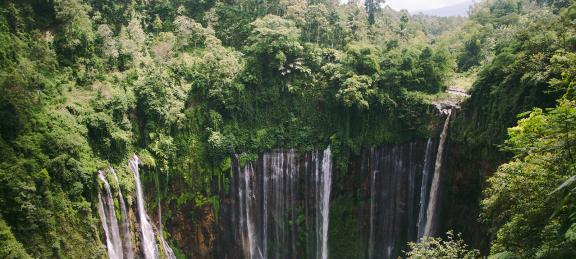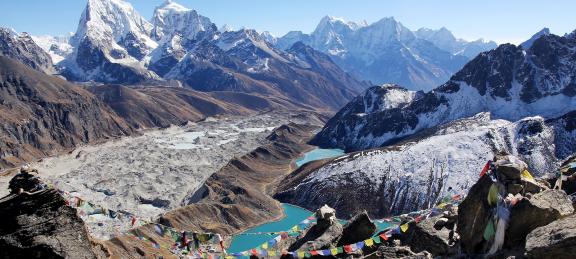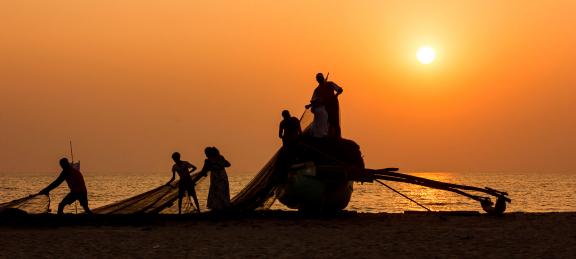United Nations Development Programme
UNDP
The United Nations Development Programme is an international organization with a strong global presence and mandate concentrated on development, with a focus on sustainable development, climate change and disaster resilience, and governance. UNDP works in partnership with entities, such as national governments, United Nations agencies, civil society organizations, and development banks, in order to support the coordinated delivery of financing to achieve transformational impact in the areas of mitigation and adaptation. Its work in adaptation covers all developing countries in all regions and includes a strong portfolio in least developed countries, small island developing states and African states. Adaptation activities include integrated climate change strategies, national adaptation plans, national planning and budgeting frameworks; cross-sectoral climate-resilient livelihoods; climate-resilient integrated water resource and coastal management; ecosystem-based adaptation; and climate-resilient energy and infrastructure. In mitigation, UNDP supports developing countries in order to create enabling environments for investment in mitigation technologies and land-uses at scale, with activities in: low-carbon energy access solutions (rural mini-grids, bio-energy and green charcoal supply chains), grid-connected renewables, energy efficient buildings and appliances, and reducing emissions from deforestation and forest degradation. Bringing with it, its experience in climate change mitigation and adaptation programming and its on-the-ground presence in developing countries, UNDP sought accreditation to the GCF.
Accreditation timeline
Accreditation date
26 Mar 2015
AMA execution date
05 Aug 2016
AMA effectiveness date
23 Nov 2016
Re-accreditation date
07 Oct 2021
Amended & restated AMA execution date
16 Mar 2023
Amended & restated AMA effectiveness date
03 May 2023
Entity details
-
Size
- Micro
- Small
- Medium
- Large
-
Environmental and social risk category
- Category C
- Category B
- Category A
- Intermediation 3
- Intermediation 2
- Intermediation 1
-
Fiduciary standards
- Basic
- Project management
- Grant award
- On-lending/blending:
- Loan
- Equity
- Guarantee
- Blending
Projects
Documents
Pages
News + Stories

GCF finance supports landmark climate action in Indonesia
24 Oct 2025 / Indonesia has achieved a significant milestone in scaling up climate action through the Reducing Emissions from Deforestation and Forest Degradation (REDD+) programme, with financing support from the Green Climate Fund (GCF). USD 499.8 million has been committed to the country under the Results-Based Payments system in recognition of its successful reduction of emissions from the forestry and land-use sectors.

Cuba's coastal communities fight climate change
04 Jun 2025 / In the coastal neighbourhood of Litoral in Manzanillo, Cuba, the sea is both a lifeline and a threat. Every time a storm darkens the sky, families like Martha Labrada’s brace for evacuation. And even on calm days, saltwater seeps silently into the land, corroding house foundations and tainting freshwater wells. “The water almost always enters this area,” says Labrada, aged 65, who has led the community council here for more than a decade. “The houses were built too close to the sea, and the mangroves are deforested.”

Keeping the heart of a town alive in Bosnia and Herzegovina
18 Apr 2025 / In Foča, a town in the southeastern part of Bosnia and Herzegovina, the Cultural Centre serves as the hub that brings people together. However, poor insulation has threatened its existence. This is a story of how climate action can keep a small town alive.

Tonga Coastal Resilience project launched in Nuku’alofa
29 Aug 2024 / Nuku’alofa, Kingdom of Tonga - Representatives from the Government of Tonga alongside the Green Climate Fund (GCF) and the UN Development Programme (UNDP) signed the project document for the Tonga Coastal Resilience Project on 29 August 2024. Funded by GCF, this landmark initiative – with a total budget of USD 23.9 million – is a significant step forward in addressing climate change impacts across the Tongan archipelago.

From scarcity to sustainability: Maldives’ ambitious water security project
22 Mar 2024 / The Maldives, known as a luxury holiday destination with crystal blue water, is an idyllic island state in the Asia Pacific region. However, the Small Island Developing State (SIDS) is one of the most vulnerable nations to climate change and faces many unique challenges. Rising sea levels and increasingly erratic rainfall patterns are threatening the country's freshwater resources, putting the health and well-being of its people at risk.

Climate crisis in the Himalayas: addressing the threat of melting glaciers in Northern Pakistan
22 Mar 2024 / In the majestic landscapes of Northern Pakistan, a silent catastrophe is unfolding. Rising temperatures have taken a toll on the Hindu Kush, Karakoram, and Himalayan glaciers, causing them to melt at an alarming rate. As a result, glacial lakes have emerged, shimmering like jewels amidst the rugged terrain. Risks and recognition These glacial lakes pose a significant risk of flooding events, capable of unleashing devastation upon the land and its people. Over seven million people live in the shadow of an impending disaster.

At Climate Ambition Summit, UN agencies and IFRC kickstart major initiative towards realising Early Warnings for All by 2027
20 Sep 2023 / At the UN Climate Ambition Summit today in New York, the UN Development Programme (UNDP) announced the development of a large-scale, collaborative push to establish life-saving Early Warning Systems in some of the world’s most climate-vulnerable countries.

Protecting Malawi with climate information and early warning systems
11 Nov 2021 / The lives of many people in Malawi, where 85 percent live in the countryside, are increasingly buffeted by climate effects. The introduction of climate information and early weaning systems, however, is helping them better prepare, and therefore avoid, weather disaster. A major aim of this GCF-funded initiative is to avoid past calamities, such as when the flooding of Lake Malawi killed hundreds.











































